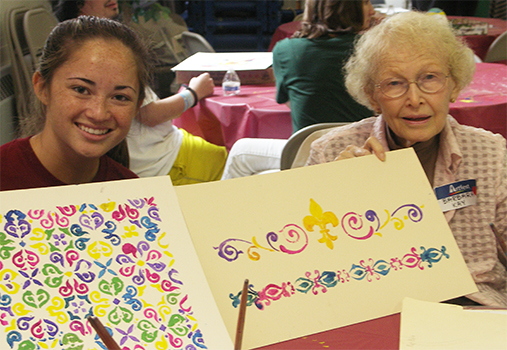An art festival unlike any other
By Victor Schaffner
Here’s the amazing thing about Artfest, the annual community event that the Center for Disabilities Studies and Art Therapy Express hosted in Newport on Saturday.
It’s not the wondrous art that was created in two hours by people with disabilities. It’s not that every imaginable adaptive art tool and every available University of Delaware student volunteer seemed to be there to assist in the creative process. And no, it wasn’t that the largest turnout in Artfest’s history happened the day the news media told us everyone was somewhere else. (Clue: The pope was appearing in nearby Philadelphia.)
The amazing thing about Artfest is that to a person, or at least to each person I spoke to at the event, it was the people who came together at the festival and the connections they made – not the art – that made it memorable. Magical.
And unique. (Or can you think of another art festival where, in the end, the art – sensational as it is, as was the case at Artfest – was talked about less by both artists and festivalgoers than the relationships the artists and festivalgoers formed with each other?)
Saturday’s event was Barbara Kay’s second consecutive Artfest. She said she enjoyed the chance to paint again at Artfest after a challenging year with her health. But it was the opportunity to pair with the same volunteer she had at last year’s Artfest – “my friend, Camryn,” Barbara said – that helped make this year’s Artfest truly special. “Seeing so many students volunteering makes me happy,” Barbara said. “People with disabilities can sometimes feel isolated, but here, people spend time building relationships. That’s important.”
Barbara’s friend Camryn – Camryn Jung – said there are too few opportunities for people with disabilities to engage with their neighbors in the community. But at Artfest, you see them come together, she said. Camryn’s a criminal justice major at UD who also works as a lifeguard, watching over kids with autism. “If there were more events like Artfest, more people in the community would be understanding,” Camryn said. Too few people are understanding when it comes to the kids she tends as a lifeguard, she said.
Lauren Camp, a volunteer who staffed a registration table at Artfest, said it’s often adults with disabilities who are “afterthoughts” and consequently aren’t understood by people in the community. It’s “good so many of them are here” at Artfest, said Lauren, who runs a summer camp for children with Down syndrome. Adults with disabilities at Artfest will develop relationships with the volunteers who pair with them, she predicted, and they’ll spark within the volunteers an interest in interacting with people outside their usual circles.
For a moment, Morgan Jungling made me reconsider my Artfest-is-unique-because-of-the-connections-people-make observation. A student in UD’s Career and Life Studies Certificate (CLSC) program, Morgan said “I liked the sculpture,” in response to my question to her about what makes Artfest special. But then Morgan, who wants to be a physical therapy assistant after finishing school, said, “My favorite thing at Artfest was seeing new people.”
That echoed Alyssa Cowin, a Junior Partners in Policymaking alumnus who was participating in her second Artfest. The event is about “making new friends,” she said. “It was great to meet new people” and, she said with a certain sense of relief, to “release stress” in such a welcoming environment.
“People were proud of their artwork at Artfest this year,” as they are every year at Artfest, said Lisa Bartoli, a veteran of eight Artfests and the event’s creative director. There was a lot of creativity, a lot of joy.
”But,” she added, “the connection people make at Artfest is what’s most special.”
Couldn’t have said it better myself.
Categories: accessibility, Center for Disability Studies, inclusion, people with disabilities, The Arts, Uncategorized
Tags: accessibility, adaptive art tools, Art Therapy Express, Artfest, autism, Center for Disabilities Studies, CLSC, community, Down syndrome, inclusion, Junior Partners in Policymaking, the arts, University of Delaware, volunteerism.



Comments